It’s an essential vegetable for a roast dinner, perfect for snacks and delicious roasted on its own to serve alongside BBQ meat, but can you freeze it and does it freeze well at all?
Can You Freeze Cabbage?
Yes, you can freeze cabbage for up to 6 months. You can freeze it in strips, wedges or as individual leaves, depending on how you normally use cabbage in your cooking.
Do Does Cabbage freeze well? Yes
Can you refreeze Cabbage? No
How to Freeze Cabbage
Cabbage is such a versatile vegetable. It can be eaten raw, sliced, left as wedges or even stuffed! But, freezing a bag of cabbage strips is the best approach you’ll want to take:
- Remove Outer Leaves
Firstly, prepare your cabbage by removing the outer leaves.
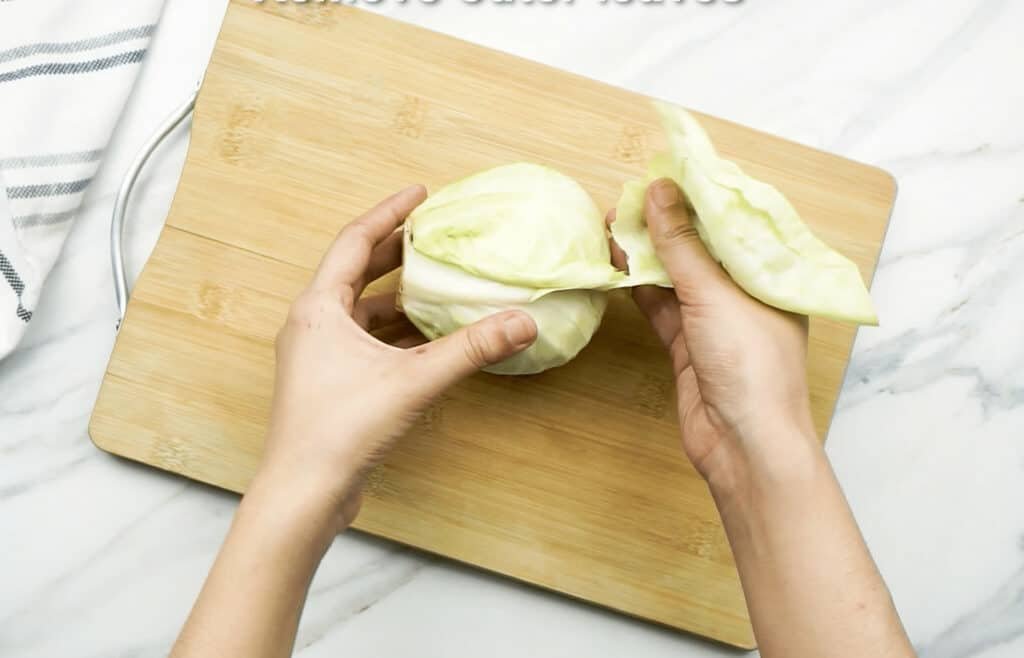
- Slice Into Strips
Next, roll up the fresh leaves into a long cigar and finely slice along the length of the cigar to create thin ribbons or stripes of cabbage.
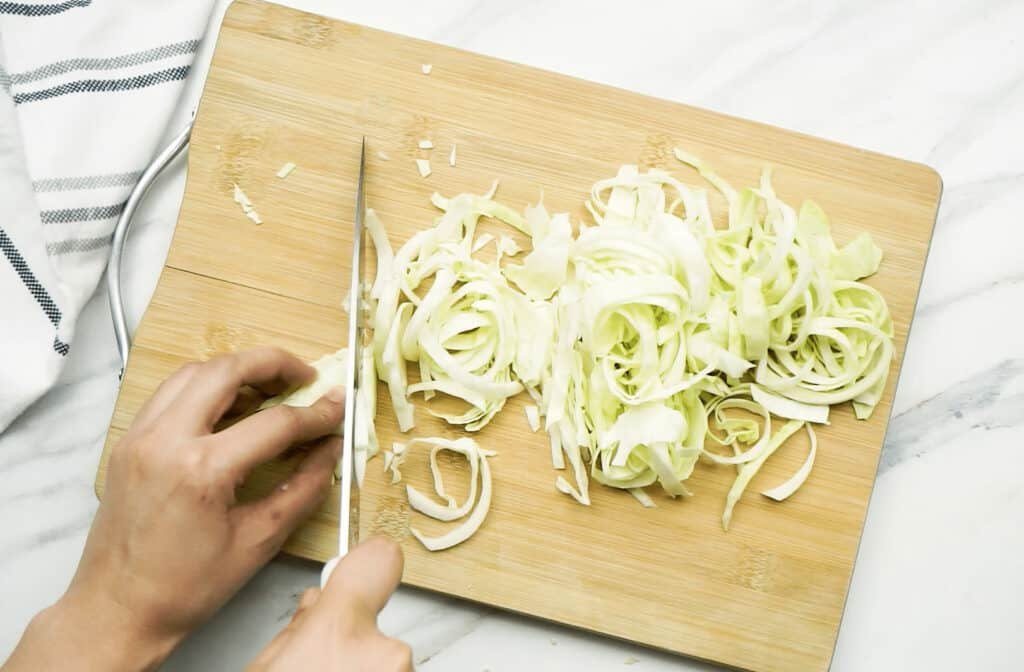
- Blanch
Blanch the strips in boiling water for just 30 seconds before instantly draining and then placing them in a bowl of ice-cold water.
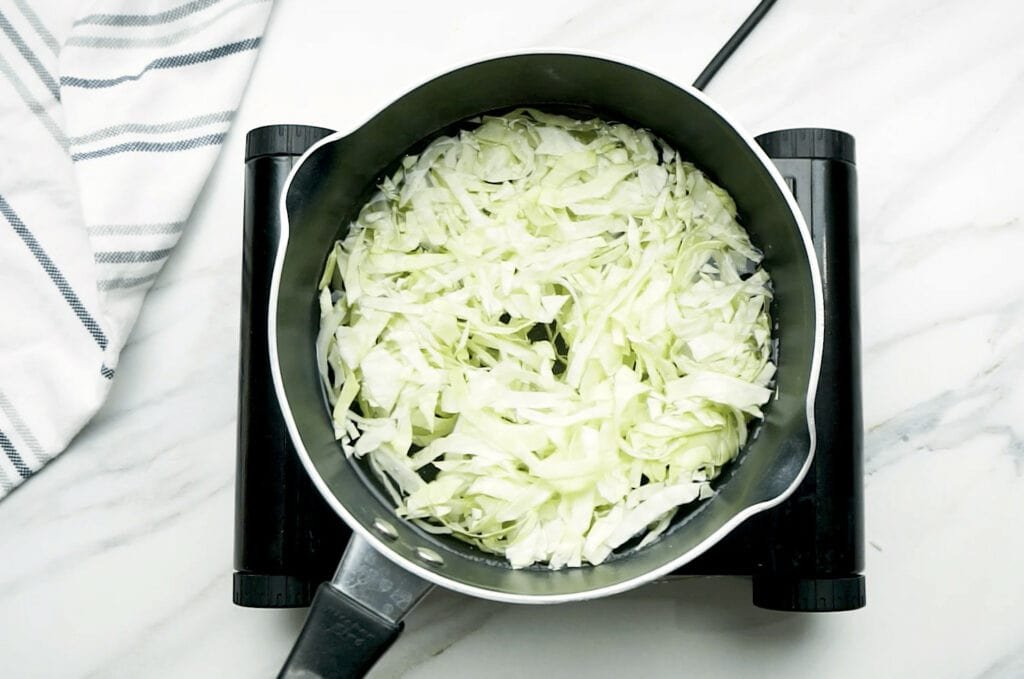
- Flash Freeze
Drain again and pat dry then spread out on a baking tray. Place in the freezer for the first stage of freezing.
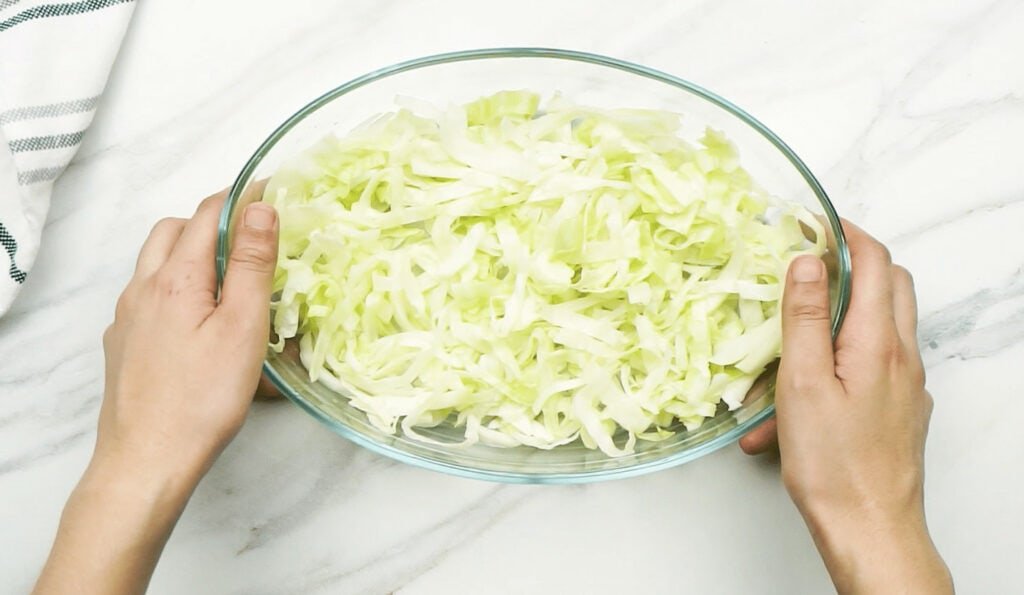
- Final Freeze
Once frozen, take your cabbage off the tray and store it in a plastic freezer bag. Some of the cabbage will have frozen to one another so don’t be afraid to ‘snap’ the cabbage into clumps as you’ll not be wanting just one single strip of cabbage anyways.
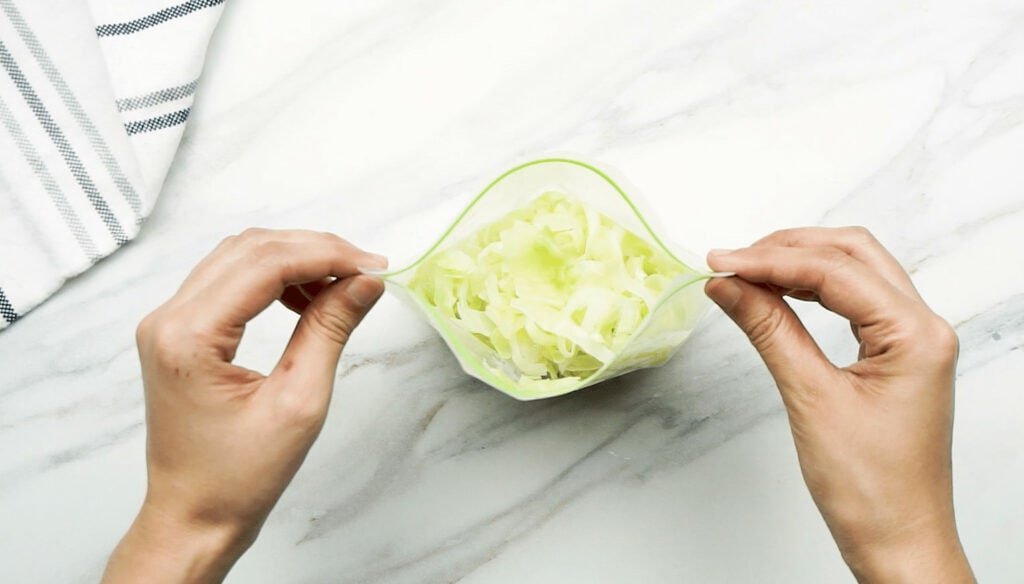
Although it’s possible to freeze raw cabbage, we would recommend blanching it beforehand. It only takes a matter of minutes but will ensure your cabbage freezes well and locks in both flavour and nutrients.
How to Freeze Different Forms of Cabbage
As I’ve already mentioned, cabbage is versatile. Although my preferred method for freezing it is in strips, there are various ways it can be frozen:
Cabbage Wedges
I’ve found that freezing cabbage wedges is quite handy, especially for dishes like soups and stews. It’s a good idea to choose a firm, fresh cabbage and give it a good wash, then cut it into wedges, keeping the core intact to hold each wedge together.
The next step takes a bit of effort but is essential. It’s blanching. Plunge the wedges into boiling water for about 3 minutes, then immediately transfer them to a bowl of iced water. Once blanched, put them onto a tray and put the tray in the freezer for a few hours until the wedges are solid.
Once frozen, I transfer them into labelled freezer bags, removing as much air as possible before sealing them tight. This way, the cabbage wedges are ready whenever I need them, and they can last in the freezer for up to 9 months.
Cabbage Leaves
Freezing individual cabbage leaves is something I do quite often, especially when I’m planning to make stuffed cabbage rolls.
The method is very similar to that above where you need to clean and then blanch the leaves. But, unlike the wedges, you’ll only want to blanch them for up to 60 seconds.
Savoy Cabbage
Savoy cabbage, with its crinkly leaves, freezes quite well and is wonderful in soups and stews. I find that its texture holds up nicely even after freezing.
My method for freezing savoy cabbage is the same as with other types. I clean it well, cut it into the desired size – either wedges or shreds, then blanch it in boiling water before flashing freezing then bagging up.
Red Cabbage
Freezing red cabbage is pretty much the same process as the green variety. The key here is to choose a cabbage that’s vibrant and crisp. I like to slice or shred my red cabbage before freezing making it perfect for quick stir-fries.
It’s worth noting that it won’t work particularly well in coleslaw or salads once frozen and thawed as it will no longer be crisp and crunchy – the whole reason you use it for a slaw!
How Long Can You Freeze Cabbage?
Like many frozen vegetables, cabbage can be frozen for a long time. For optimal results for use in cooking, store your frozen cabbage for up to 6 months in the freezer.
I also find that the most cuts I make in the cabbage, the quicker is degrades. So large wedges can be frozen for around 9 months but really finely shredded cabbage might only keep well for 2 or 3 months.
It is important to label your container before placing it in the freezer so it stays at its best before being used for cooking.
Cabbage is one of the longest-lasting vegetables when stored correctly. Cabbage will last for around 3 weeks in the fridge. This is only when kept whole.
How Do You Defrost Cabbage?
If you’re defrosting cabbage wedges, you’ll want to place the wedge in the fridge, allowing it to defrost overnight. This also applies to whole leaves, although they will thaw much quicker.
However, the good news is if you’re looking to defrost cabbage strips well… You don’t need to!
Simply take the cabbage straight from the freezer and add to a pan of boiling salted water. Boil for a few minutes until the cabbage is just cooked through (no one wants stewed cabbage).
Yes, absolutely! I often use the microwave to defrost frozen cabbage simply using the defrost setting. Check the cabbage every 30 seconds when defrosting and stir it every time you check it.
Can You Refreeze Cabbage?
Cabbage won’t refreeze well at all.
It will be safe to refreeze, but you will instantly notice the texture changes dramatically when refrozen. This is why flash freezing is so important. It makes it far easier to grab a portion at a time.
Does Cabbage Freeze Well?
It certainly does. Freezing cabbage helps it to maintain its nutritional value. Like with most ingredients, there is a risk that the texture will break down slightly if you leave it in the freezer for an extended period of time.
That’s why it’s vital you manage your freezer efficiently to avoid wasting it.
Sources
We have verified the information on this page using the following resources:


